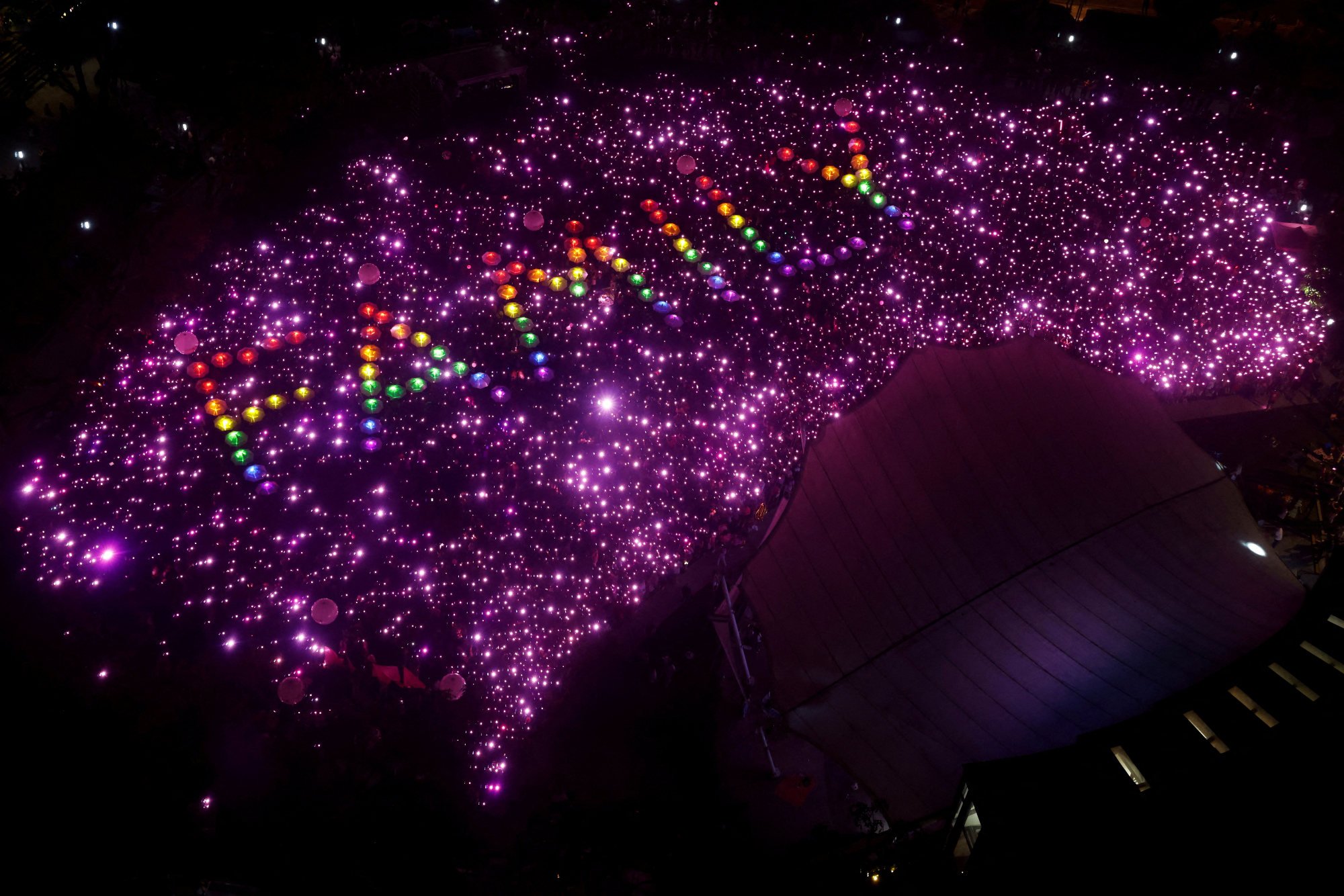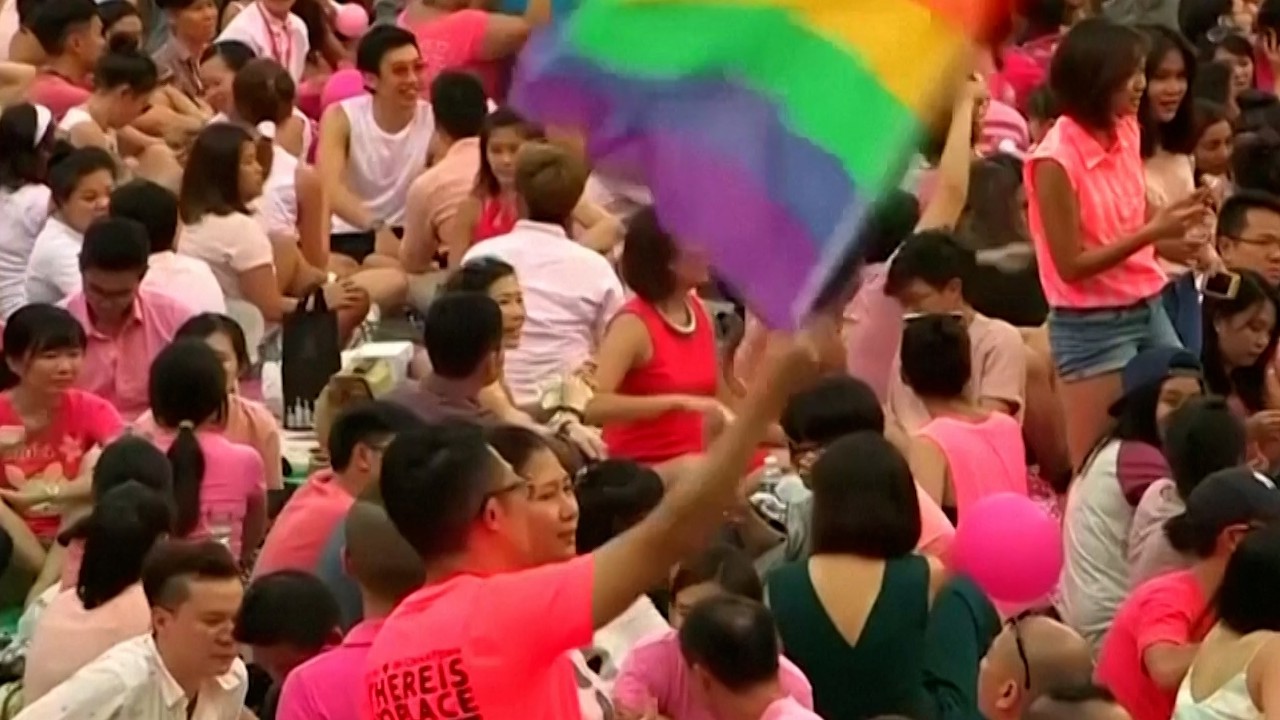Singapore’s 377A: 1 year after repeal, LGBTQ couples ask for more but conservative pushback in society still strong
[ad_1]
Simply fulfilling her aspirations of being a mother and starting a family with her 40-year-old wife Ching Chia, who works as a property agent, required immense financial resources – and clever legal manoeuvring.
The challenges they have overcome reflect the barriers that continue to exist for many queer couples in Singapore, despite the country’s historic move to strike its anti-gay sex law off the books a year ago this week.
Pink Dot: Singapore’s LGBTQ activists eye ‘long road’ to equality
Pink Dot: Singapore’s LGBTQ activists eye ‘long road’ to equality
But while it had been a hopeful landmark of progress towards equal rights for LGBTQ people in Singapore, many in the community have also been grappling with the stark reality that their dreams surrounding housing, parenthood and marriage will remain as elusive as before, even as the country continues to find its way forward on issues such as representation and visibility.
In October, a drag performance titled Queer-Tai, which was staged as part of a series of art performances for the 10th anniversary of an arts-based research centre of the Nanyang Technological University, became a controversial issue after the local university said that it “should not have been staged as a public event” given the “sensitivities associated”, according to local media reports.
More recently, Chinese language media outlets drew ire from members of the LGBTQ community for using derogatory terms to describe transgender sex workers in reports about a police raid in December.
A poll of 1,000 Singaporean people aged 16 to 34 by Pink Dot and Milieu Insight, a consumer research firm, found that six out of 10 respondents believed discrimination against LGBTQ people continued to persist, and only 36 per cent described Singapore as a liveable city for members of the community.
The barriers to starting families and buying homes emerged as among the most pressing LGBTQ-related issues for respondents, according to the results of the study released in September.
Clement Tan, a spokesman for Pink Dot, Singapore’s LGBTQ rights movement, said the group saw “an encouraging rise in social acceptance” with more dialogue about LGBTQ-related issues, noting that national broadcaster CNA had aired a documentary about sexuality, which would have been “unthinkable a year before”.
Singaporeans to feel ‘pinch’ from GST hike even with cushioning measures
Singaporeans to feel ‘pinch’ from GST hike even with cushioning measures
However, he said this was accompanied by a “stronger reactive pushback from conservative groups, who are now drawing new battle lines and are actively lobbying government institutions on various LGBTQ-related matters”.
The act of repealing Section 377A was “in practice, a small step” and had not had a material impact on long-held norms centred around heterosexual unions, said Tan Ern Ser, a sociologist from the National University of Singapore.
“The reason is that 377A was not actively enforced in the first place. Repealing it thus has minimal or no impact on prevailing heteronormative norms and practices, nor on the definition of marriage and the institution of the family in Singapore, and more generally, on public policy,” Tan said.
For Chia, this means that, despite her daughter just having turned 4.5 months old, she and her partner feel forced to start planning their wills and guardianship of their child.
“As Ching does not have any legal rights over our daughter, this means that if I pass away, she does not automatically get to take care of our child. She is not recognised as a parent at all and this gives us a lot of anxiety,” she said, adding that they had engaged a lawyer to ensure their wills would be “ironclad”.

“There are also other issues such as inheritance not going to our daughter as we’re not seen as a ‘biological’ family, but that’s another battle for another day,” she said.
Besides parenthood or marriage, Singapore’s housing laws, which favour young hetero-normative families, also make home ownership out of reach for LGBTQ couples. Because each partner is legally regarded as single, they have to be aged 35 to buy a resale public housing flat.
Clarissa* has been with her partner for more than five years but will have to wait another five before she can qualify to buy such a flat so they can live together.
“That’s a decade of us denied affordable housing, something that straight Singaporean couples will never have to worry about,” said the 30-year-old.
The only other options were to buy private property or rent, which she described as “far from ideal in our housing market where a non-prime one-bedder now can cost around S$3,000 per month to rent or close to S$1 million to purchase”.
Singapore’s turbulent yet tantalising 2023: political scandals to pop sensations
Singapore’s turbulent yet tantalising 2023: political scandals to pop sensations
“In my opinion, equality is nowhere in sight. Beyond housing, I have to spend extra time and money to ensure that my partner and I are protected,” she said, adding that the couple had started planning how to ensure that their assets would go to the surviving partner if the other were to die.
Decriminalisation was only the “starting line of the long race towards full equality”, said Leow Yangfa, the executive director of LGBTQ counselling group OogaChaga.
“Some may assume that the next lap, or maybe even the finishing line, is marriage equality. In fact, achieving marriage equality would only be just one of the many laps along the way, there are more laps to go,” he said, adding that this included equal treatment and protection in areas like education, healthcare, legal gender recognition and media representation.
The repeal of 377A was not “exactly a move to increase the inclusion of LGBTQ persons into the broader Singapore community”, said Mathew Mathews, principal research fellow at the Institute of Policy Studies think tank.
“You can still expect that a majority of the population will not be in favour of legalising gay marriages and may be uncomfortable with some forms of display of LGBTQ identity in public. For this group, their beliefs about sexuality are deeply ingrained, often stemming from their religious beliefs, and will be unlikely to change easily.”
Singapore PM Lee warns of threat from deepfakes ‘spreading disinformation’
Singapore PM Lee warns of threat from deepfakes ‘spreading disinformation’
However, advocacy groups and activists say not all hope is lost, noting an uptick in the number of LGBTQ-friendly businesses, increased visibility of the community in the media and government-led moves to curb workplace discrimination against queer couples.
Roy Tan, a retired doctor and prominent LGBTQ activist, said there was “good reason to expect less discrimination against LGBTQ people in the workplace in the coming years”, pointing to a tripartite committee’s recent briefing on workplace discrimination, which included 12 different LGBTQ organisations.
“However, contrary to expectations that censorship, media representation of LGBTQ people, proscriptions against waving the rainbow flag in public, and public performances featuring LGBTQ themes would be relaxed after the repeal of Section 377A, this did not materialise,” he said. “It was probably to placate the conservatives who were vehemently against the repeal.”
Some LGBTQ organisations are working on plans to further mobilise support for fundamentally equal rights.
This Year in Asia: Singapore criminals, Taylor Swift’s snubs, Robert Kuok at 100
This Year in Asia: Singapore criminals, Taylor Swift’s snubs, Robert Kuok at 100
“Moving forward, Pink Dot is looking to build on the momentum generated from the repeal movement – which brought together no fewer than 23 different community groups by the time it was announced – and continue to partner with them closely,” said Tan, its spokesman.
Many LGBTQ couples cannot wait for equality to come to Singapore and some, like Clarissa, have not ruled out moving to countries where they can live freely and enjoy the same protections and privileges provided to their heterosexual peers.
“It does sadden me that I have to leave my home country at some point, we have no other choice to secure our future together,” she said.
Chia and her wife are bracing themselves for the possibility that their daughter may face discrimination when she is older due to their “non-traditional” family unit. But the couple are hopeful things will be much better for Singapore’s LGBTQ families and their broader community in future.
“It is our hope that she would not only grow up to be a confident and resilient young person but that Singapore would also finally become a kinder place where all types of families are celebrated and can thrive,” Chia said.
*Name changed at interviewee’s request
[ad_2]
Source link


